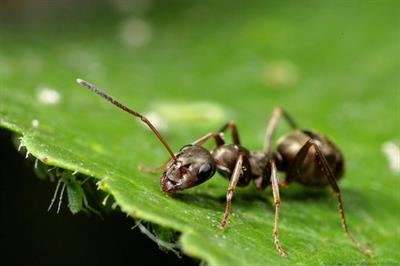Ants sacrifice their colony mates as parts of a deadly disinfection

New research from the IST Austria (Institute of Science and Technology Austria), in collaboration with Royal Holloway, University of London, and the University of Würzburg, has found that Lasius neglectus ants sacrifice ill ants to protect their colony from infection.
In a paper published today in eLife, researchers showed that ants kill colony mates infected with deadly diseases when they cannot care for them to reach health anymore. In this way, ants can protect their colony from the outbreak of an epidemic.
Christopher Pull, a Ph.D. student, and Sylvia Cremer, from IST Austria looked at ants that came into contact with Metarhizium, a pathogenic fungus that can spread from ant to ant. Christopher Pull is now a postdoctoral researcher in the School of Biological Sciences at Royal Holloway, University of London.
Christopher Pull from Royal Holloway, University of London, said: "The ants could smell if members of their colony were fatally ill. This fungus becomes a danger to the whole colony if even one ant sporulates with it, so the ants have formulated an effective way to deal with it: kill their fatally infected colleagues."
The fungus reproduces in the bodies of the ants, so they become a source of infection for the rest of the colony.
Sylvia Cremer, from IST Austria, continued: "These ants literally 'disinfect' their colony mates in a fatal way; they "inject" them with formic acid, which is deadly both to the fungus, and the ant."
"The ants do try to get rid of the fungus first," Professor Cremer notes. "They care for the pathogen-contaminated colony members by intensively grooming their bodies to get rid of the fungus' spores. If this doesn't prevent infection, however, they kill the infected colony-members."
A deadly signature
The researchers found that infected ants give off signals that tell other ants they are fighting a pathogen. Ants produce hydrocarbons on their exoskeleton that act as a "signature" for other ants. When ants are sick, they produce extra hydrocarbons that change their signature, giving off a signal that they are sick. This works in a similar way to a human immune system, where sick cells can be identified by cells of the immune system because of their signature.
"This is a really interesting finding," explains Christopher Pull. "Ants in a colony work together like cells in a body, with healthy ants acting like white blood cells to kill off other ants they perceive as a threat."
More information: Christopher D Pull et al. Destructive disinfection of infected brood prevents systemic disease spread in ant colonies, eLife (2017). DOI: 10.7554/eLife.32073
Journal information: eLife
Provided by Royal Holloway, University of London



















